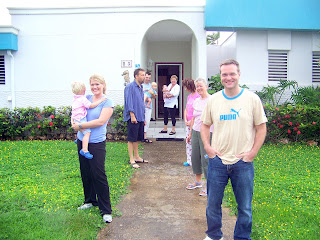Pam had already appended her flourish, and now it was my turn. As I stood there in the registry office in the sleepy little Puerto Rican coastal town of Dorado, a cheap plastic ballpoint pen in my right hand as I prepared to take one of the most important decisions of my life, I must have paused for the merest fraction of a nanosecond.
The woman ducked beneath the counter behind her glass screen for a moment, and reemerged brandishing a pistol. "Sign it now," she snapped, gesturing impatiently at the blank space on the piece of paper.
It took a moment for me to notice the huge grin on her face, another to spot that the gun was made of plastic.

We'd already had the blood tests required of anyone planning to marry in Puerto Rico, and were relieved to find that neither of us had gonorrhea or chlamydia. How romantic. We'd shuttled back and forth between various government offices, nerves fraying in the tropical heat, dispensing substantial sums of money to substantial numbers of people.
As I stared down the barrel of the gun, I had another of what I call my Moments, when I think: is this real? how did I get here? I've had a lot of those in the past few years.
Bureaucracy aside, it was a thoroughly happy and wholly unforgettable week. We rented a house with a pool on this beautiful island and invited a small selection of our nearest and dearest to share our wedding with us. Here they all are.

From left to right, they are Pam's daughter Dana and her son Rowan. Then there's my friend Bill, who I'll tell you more about in a moment. Behind him is my brother-in-law Richard and his son Alfie. Pam is standing on the doorstep with her two-month-old granddaughter Arden. Next come my sister Jacqui, Bill's wife Daff, and Dana's husband Scott.
Bill was a secondhand book dealer until a few years ago, but in a dramatic midlife career change he became a Church of England priest. He was kind enough to conduct the marriage ceremony for us, cheerfully tolerant of my lack of religious belief.
I met Bill at university thirty years ago, where I formed a Scrabble club and he was one of the first members. Since then, our every encounter has been accompanied by the rattle of plastic tiles.
I suspect that for him the highlight of the week was not presiding over his friends' marriage, not the lush, mountainous scenery, not the convivial company or generous quantities of Caribbean rum, but the poolside game on Sunday, our wedding day.
He scored an extraordinary personal best of 205 points in one go, spread across two triple word scores and with a fifty-point bonus for getting rid of all his letters. He played crappily. No, sorry, he played CRAPPILY, off my LATRINE.

And so to the wedding itself. We held it on a quiet little stretch of wave-lapped, palm-fringed sand decked with long strings of beach morning glory, candles and coconut shells. Pam made her entrance from several hundred yards away and gingerly picked her way across a stream in her long coral-coloured dress before she reached us.
The only thing missing was sunshine: a tropical depression was brewing, and there was drizzle in the air. But the brightness to the west could have passed for a sunset, and the rain obligingly held off until the end of our short, simple ceremony; next day, the island suffered major flooding.
Here's some pictures. I thought Pam looked wonderful. I don't have any of both of us yet, because I took them, but as soon as someone sends me some I'll put them on here.












